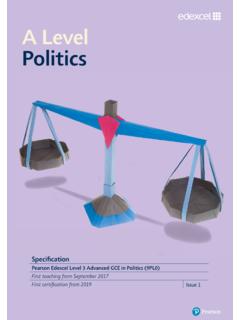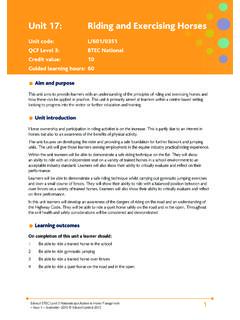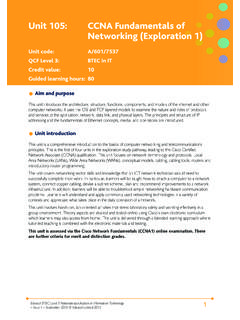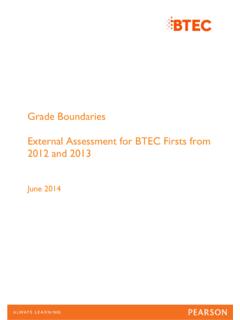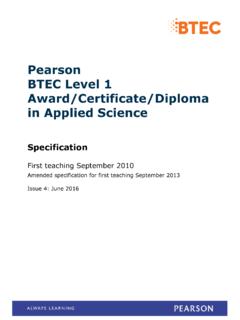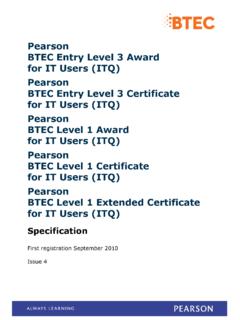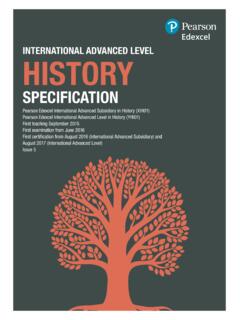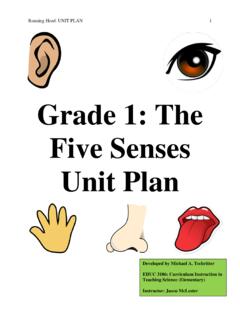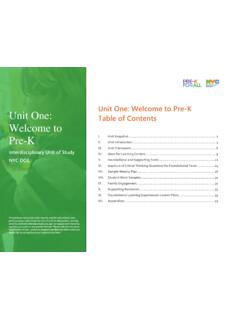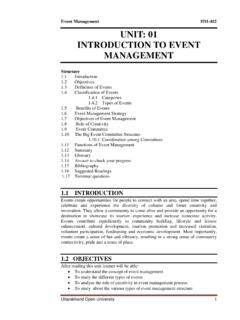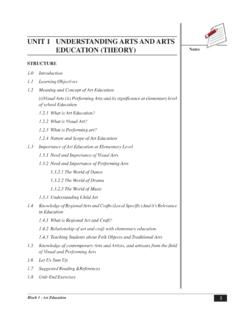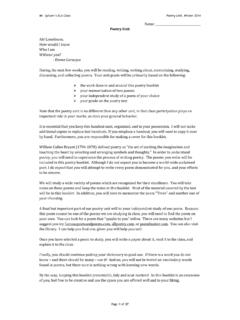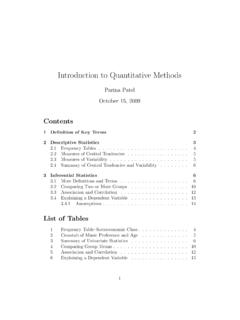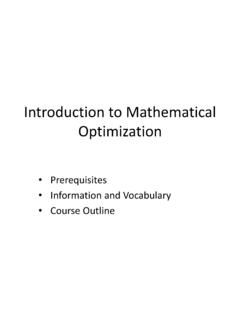Transcription of Unit 1: Developing Effective Communication in Health and ...
1 unit 1: Developing Effective Communication in Health and Social Care unit code: R/600/8939. QCF Level 3: BTEC Nationals Credit value: 10. Guided learning hours: 60. Aim and purpose This unit aims to enable learners to understand Effective Communication , the barriers that may exist and ways to overcome these. The unit will give learners the opportunity to gain the interpersonal skills needed to embark on a career within the Health or social care sectors. unit introduction This is a core unit within the programme, recognising the fact that Effective Communication is central to all work in the Health and social care sectors. Professionals within the sectors require good Communication and interpersonal skills to perform their roles effectively, work cooperatively with colleagues and build supportive relationships with people using services. It is, therefore, important for all those embarking on a career in the Health or social care sectors to gain knowledge, understanding and the skills associated with Communication , so that they are able to develop Effective interpersonal skills.
2 Initially, learners will investigate what is meant by Effective Communication and interpersonal skills and how these may affect the outcomes for people who use services. Learners will consider the factors that influence Communication and interactions, analysing theories which may help to explain why there may be difficulties, possible breakdowns in Communication and ways to overcome these. The benefits of Effective Communication for people who use services will be explored. The unit will give learners opportunities to reflect on their performance, and that of others, consolidating their learning by demonstrating their skills in a one-to-one and a group interaction in a Health and social care context. The knowledge and skills gained from this unit will support achievement in all units within the BTEC. Level 3 Nationals in Health and Social Care. There are particular links with unit 6: Personal and Professional Development in Health and Social Care as a period of work experience provides opportunities for the development and assessment of Communication skills.
3 Edexcel BTEC Level 3 Nationals specification in Health and Social Care Issue 1 June 2010 Edexcel Limited 2010. 1. Learning outcomes On completion of this unit a learner should: 1 Understand Effective Communication and interpersonal interaction in Health and social care 2 Understand factors that influence Communication and interpersonal interaction in Health and social care environments 3 Understand ways to overcome barriers in a Health and social care environment 4 Be able to communicate and interact effectively in a Health and social care environment. Edexcel BTEC Level 3 Nationals specification in Health and Social Care 2 Issue 1 June 2010 Edexcel Limited 2010. unit content 1 Understand Effective Communication and interpersonal interaction in Health and social care Contexts: one-to-one; groups, eg formal, informal, between colleagues, between professional and people using services, Communication with professionals, multi-agency working, multi-professional working Communication : forms, eg text messaging, written, oral, signing, symbols, touch, music and drama, objects of reference, arts and crafts, technology Interpersonal interaction: types, eg speech, language (first language, dialect, slang, jargon), non-verbal (posture, facial expression, touch, silence, proximity, reflective listening).
4 Communication and language needs and preferences: the individual's preferred method of Communication , eg language, British Sign Language, Makaton, Braille, the use of signs, symbols, pictures and writing;. objects of reference, finger spelling, Communication passports, human and technological aids to Communication , variation between cultures 2 Understand factors that influence Communication and interpersonal interaction in Health and social care environments Theories of Communication : Argyle's stages of the Communication cycle (ideas occur, message coded, message sent, message received, message decoded, message understood); Tuckman's stages of group interaction (forming, storming, norming, performing). Environment: factors, eg setting, noise, seating, lighting, space, time Barriers: factors, eg type of Communication (difficult, complex, sensitive), language needs/preferences, sensory impairment, disability, personality, self-esteem, anxiety, depression, aggression, submissiveness, assumptions, value and belief systems, jargon, cultural variations, use and abuse of power, effects of alcohol/drugs 3 Understand ways to overcome barriers in a Health and social care environment Communication and interpersonal interaction: possible strategies, eg staff training, assessment of need, using preferred method, promoting rights, confidentiality, defusing aggression, assertiveness, appropriate verbal/.
5 Non-verbal Communication , building relationships, appropriate environment, attitude, confidence Aids to Communication : human (advocates, interpreters, translators, signers, mentors, befrienders), technological aids (hearing aids, text phones, minicom, voice activated software, relay systems, loop systems). 4 Be able to communicate and interact effectively in a Health and social care environment Contexts: formal; one-to-one; group; with people using services; with professionals/colleagues Communication skills: verbal and non-verbal, eg listening and responding, tone, pace, language, appropriate environment, proximity, clarifying or repeating, questioning, responding to difficult situations, defusing anger Effectiveness: group and one-to one situations, eg awareness of needs and preferences, interpersonal skills, attitudes, overcoming barriers, adjusting interactions, assertiveness Edexcel BTEC Level 3 Nationals specification in Health and Social Care Issue 1 June 2010 Edexcel Limited 2010.
6 3. Assessment and grading criteria In order to pass this unit , the evidence that the learner presents for assessment needs to demonstrate that they can meet all the learning outcomes for the unit . The assessment criteria for a pass grade describe the level of achievement required to pass this unit . Assessment and grading criteria To achieve a pass grade the To achieve a merit grade the To achieve a distinction grade evidence must show that the evidence must show that, in the evidence must show that, learner is able to: addition to the pass criteria, in addition to the pass and the learner is able to: merit criteria, the learner is able to: P1 explain the role of Effective M1 assess the role of Effective Communication and Communication and interpersonal interaction in a interpersonal interaction in Health and social care context Health and social care with [IE3] reference to theories of Communication P2 discuss theories of D1 evaluate strategies used Communication in Health and social care [IE4.]
7 CT3] environments to overcome barriers to Effective P3 explain factors that may M2 review strategies used Communication and influence Communication and in Health and social care interpersonal interactions interpersonal interactions environments to overcome in Health and social care barriers to Effective environments Communication and [IE2; IE5; IE6; CT1] interpersonal interactions P4 explain strategies used in Health and social care environments to overcome barriers to Effective Communication and interpersonal interactions [IE1; IE6; CT1]. P5 participate in a one-to-one M3 assess their Communication D2 evaluate factors that interaction in a Health and and interpersonal skills in influenced the effectiveness of social care context relation to each interaction. each interaction. [CT5; RL6; SM3]. P6 participate in a group interaction in a Health and social care context. [CT5; RL6; SM3]. PLTS: This summary references where applicable, in the square brackets, the elements of the personal, learning and thinking skills which are embedded in the assessment of this unit .
8 By achieving the criteria, learners will have demonstrated Effective application of the referenced elements of the skills. Key IE independent enquirers RL reflective learners SM self-managers CT creative thinkers TW team workers EP Effective participators Edexcel BTEC Level 3 Nationals specification in Health and Social Care 4 Issue 1 June 2010 Edexcel Limited 2010. Essential guidance for tutors Delivery This practical unit should be delivered using a mixture of tutor input and learner-led activity, such as role play and case studies. Initially, learners should explore Communication and interpersonal skills used in the Health and social care sectors. Learners could work in small groups to identify contexts, and consider the role of Communication , for example between a professional and an individual when assessing needs and providing information, or between professionals when sharing information. Learners will need time within their workplace settings to observe interactions which may be used to illustrate Effective Communication .
9 When introducing theories and stages of Communication it would help if learners are able to understand each stage in the context of a realistic interaction. One-to-one role plays could be used, with time to reflect on the stages of the Communication cycle, and group interactions used to introduce Tuckman's stages of team interaction. Learners should be introduced to a range of factors which affect Communication and interpersonal interactions so that they are able to explain these. Examples could be taken from personal experience, television programmes, documentaries or current newspapers. These examples should include more difficult concepts, such as the imbalance in power inherent in the helping relationship, empowerment and learned helplessness. A guest speaker could provide an insight into cultural variations in verbal and non-verbal Communication . Aids to Communication should be explored in a practical way, exploring how technology works in practice, and the role of human aids for example playing' the part of an advocate in role play.
10 A taster session for British Sign Language and or Makaton may encourage learners to develop these skills further. When explaining factors that influence Communication , learners find it relatively easy to identify certain factors such as body language and trust. However, they also need to recognise why empathy, responsiveness, attentiveness and respect are so important. Many of the skills in this unit for example using prompts, reflection, empathy or open-ended questions can be developed in a counselling skills training format. Others, such as assertiveness, can be developed through role play. When Developing their assertiveness skills, learners will need to appreciate the difference between being assertive and being aggressive. Learners need to understand what is involved in Effective Communication , considering the question of values to be able to explain, review and evaluate strategies. This could be covered by discussing what makes Communication ineffective. Can learners identify times when someone did not listen to them, looked through them or patronised them?
